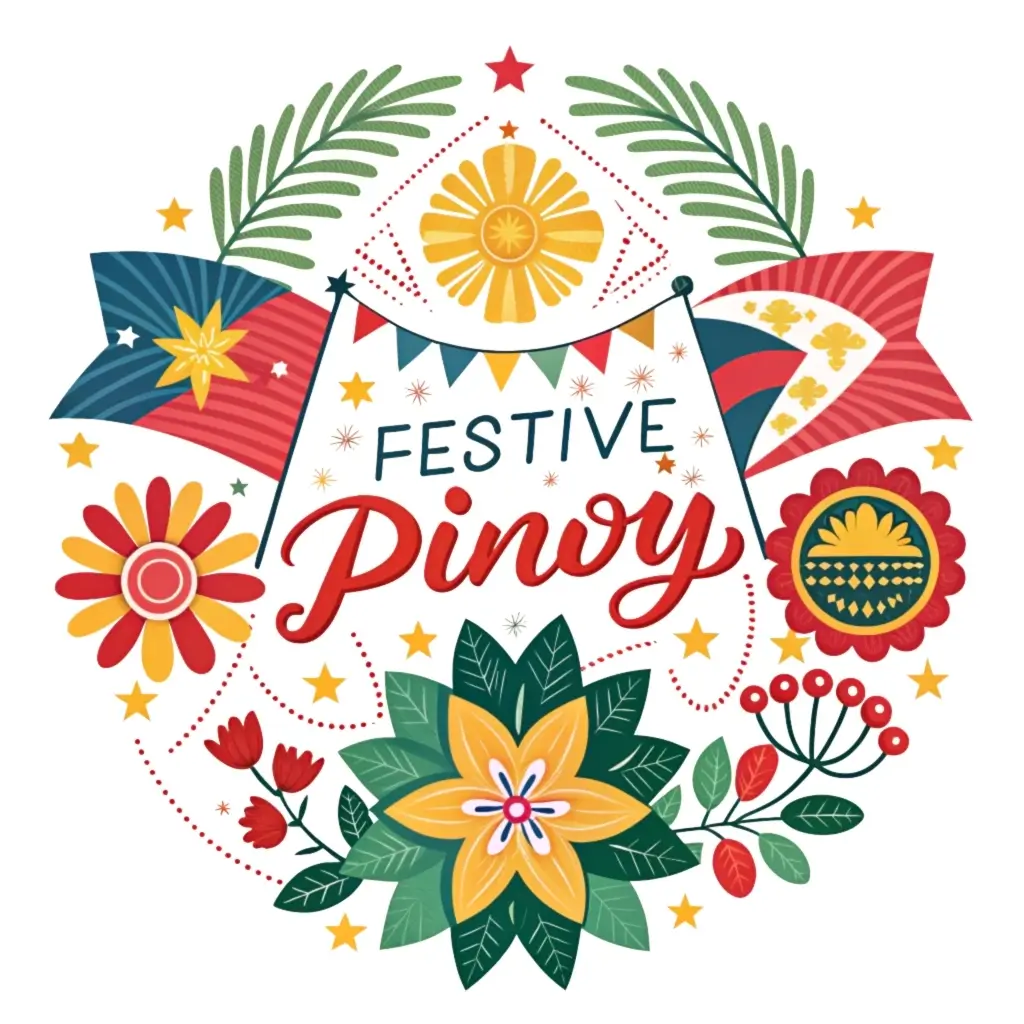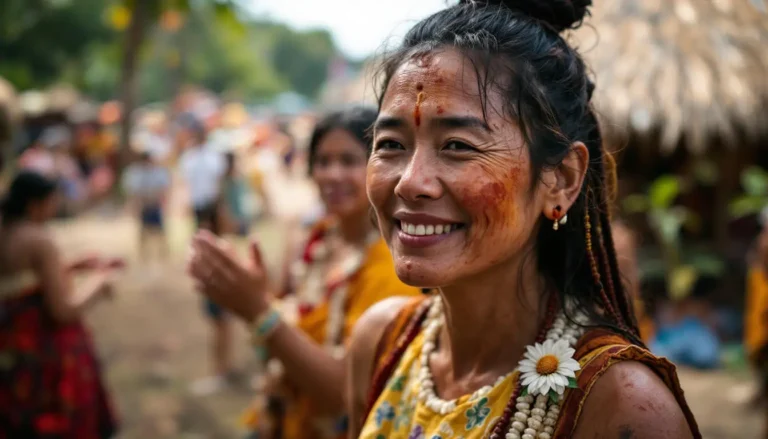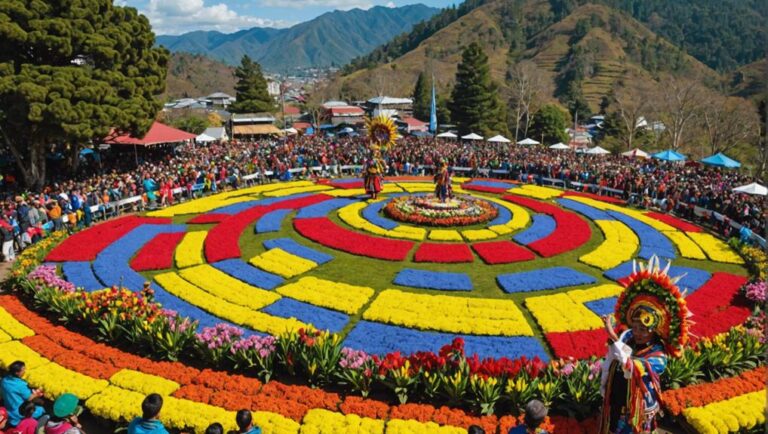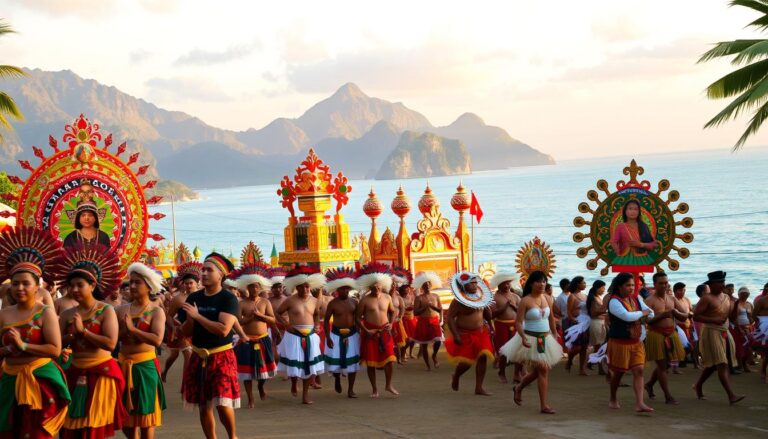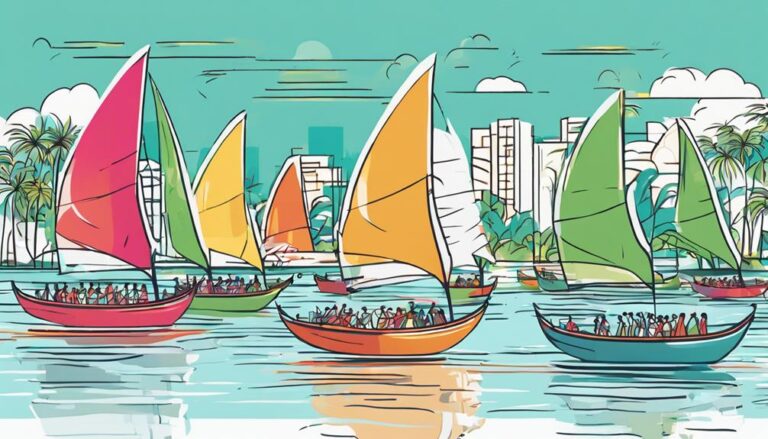Bangus Festival: Celebrating the Iconic Fish of Pangasinan
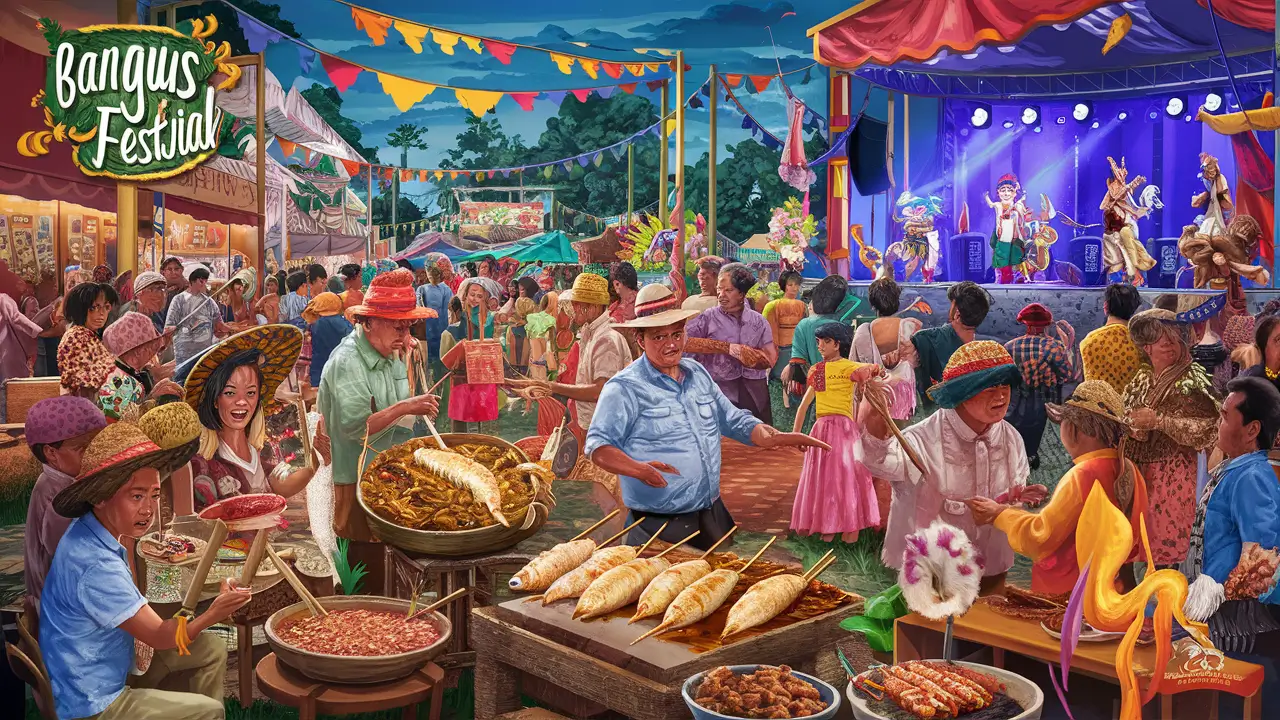
The Bangus Festival, held annually in Dagupan City, Philippines, celebrates the cultural and economic importance of milkfish (bangus) in Pangasinan province. Inaugurated in 2002, this vibrant event features street parades, culinary competitions, and beauty pageants.
The festival showcases the versatility of bangus in Filipino cuisine through various cooking contests and food exhibitions. It attracts thousands of visitors, boosting local tourism and the economy. Community involvement is strong, with residents participating in organizing events and showcasing traditional recipes.
The Bangus Festival has evolved from a local celebration into a nationally recognized event, reflecting the region’s rich aquaculture heritage. Exploring the festival’s activities reveals the deep connection between Pangasinan’s people and their iconic fish.
Key Takeaways
- The Bangus Festival, inaugurated in 2002, celebrates Dagupan City’s fishing heritage and the milkfish industry in Pangasinan.
- Main events include a street parade, grilling competition, beauty pageant, and trade fairs showcasing regional products.
- The festival highlights the cultural importance of milkfish (bangus) in Filipino cuisine and regional identity.
- Culinary competitions showcase the versatility of milkfish, with grilling, cook-offs, and plating contests.
Bangus Festival At A Glance
| Facts | Explanation |
|---|---|
| Festival Name | Bangus Festival |
| Type of Festival | Cultural |
| City of Origin | Dagupan City |
| Festival Etymology | “Bangus” is the Filipino term for milkfish, a local fish that is the focus of the festival. |
| Date Celebrated First | 2002 |
| Dates Celebrated Annually | April |
| Founder of the Festival | Dagupan City Government |
| Brief History of the Festival | The Bangus Festival was launched to celebrate the city’s reputation as the “Bangus Capital” of the Philippines. It showcases the local milkfish industry and highlights the cultural heritage of Dagupan City. |
| Brief History of the City | Dagupan City, located in Pangasinan, has been known for its rich agricultural land and booming fishery industry. It has evolved from a small fishing community into a vibrant urban center with a strong local economy. |
| Ethnic Information | The city and region are predominantly Ilocano, an ethnic group known for their distinct language, traditions, and agricultural practices. |
| Location Explanation | Dagupan City is situated in the northern part of Luzon Island, Philippines, within the province of Pangasinan. |
| How to Reach the City | By Air: Fly to Clark International Airport or Manila Ninoy Aquino International Airport, then take a bus to Dagupan City. By Land: Buses from Manila and other nearby cities are available. |
| Nearby Cities or Towns | San Carlos City (35 km), Alaminos City (40 km), Lingayen (18 km) |
| Google Map Link | Dagupan City Location |
| Festival Main Events and Activities | – Street Dancing Parade – Fluvial Float Parade – Bangus Cooking Contest – Various cultural performances |
| Famous Tourist Attractions and Landmarks | Lingayen Gulf – Historic site of World War II landings. Dagupan City Plaza – Central hub for city events. Hundred Islands – Scenic group of islands offering beaches and natural beauty. |
| Famous Food Dishes | Bangus Sisig – A crispy, spicy milkfish dish. Bangus Belly – Grilled or fried milkfish belly. Pinakbet – Vegetable stew with shrimp paste. |
| Related Festivals | Pangasinan Puto Festival – Celebrates local rice cakes in the province. Binatbatan Festival – Highlights the culture and heritage of the neighboring city of Vigan. |
Origins of the Bangus Festival
The Bangus Festival inaugurated in 2002, emerged as a celebration of Dagupan City’s rich fishing heritage and its prized milkfish industry. This annual event, held every April, quickly became a cornerstone of Pangasinan’s cultural calendar, highlighting the historical significance of bangus in the region.
The festival’s origins are deeply rooted in the city’s fishing traditions, which have sustained local communities for generations. Organizers designed the event to showcase the cultural importance of milkfish, while also boosting local economic growth and tourism. What began as a modest local celebration has since evolved into a nationally recognized festival, drawing visitors from across the Philippines and beyond.
The Bangus Festival not only honors the iconic fish but also serves as a platform to promote Dagupan’s unique cultural identity and thriving aquaculture industry.
Cultural Importance of Milkfish
Milkfish, known locally as bangus, holds a paramount position in Filipino cuisine and culture, serving as both a dietary staple and a symbol of regional identity for Pangasinan and its surrounding areas. This iconic fish is deeply interwoven with the region’s cultural traditions and fishing heritage, representing generations of aquaculture expertise.
Bangus preparation techniques, passed down through families, showcase the culinary ingenuity of Pangasinenses. The fish’s versatility in cooking methods, from grilling to fermenting, reflects the adaptability and resourcefulness of coastal communities. Beyond its culinary significance, bangus also plays a role in local folklore and art, appearing in stories, songs, and crafts that celebrate the region’s maritime legacy.
As a cornerstone of the local economy, bangus fishing and farming have shaped social structures and community dynamics, reinforcing the fish’s importance in daily life and cultural identity.
Main Events and Activities
While bangus holds deep cultural significance, the Bangus Festival brings this importance to life through a vibrant array of events and activities that celebrate the fish in grand style. The festival’s main attractions showcase the region’s rich traditions and culinary expertise:
- Street Parade: A colorful procession featuring dancers, floats, and bangus art
- Bangus Grilling Competition: Culinary experts compete to create the best-grilled milkfish
- Beauty Pageant: Contestants vie for the Miss Bangus title, embodying festival traditions
These events not only entertain but also educate visitors about the importance of bangus in Pangasinan’s culture and economy. From the lively street performances to the mouthwatering aroma of grilled milkfish, the festival submerges attendees in a sensory experience that celebrates the iconic fish. Environmental activities and cultural workshops further enrich the festival, ensuring a well-rounded celebration of Pangasinan’s heritage.
Economic Impact on Dagupan City
As a cornerstone of Dagupan City’s cultural calendar, the Bangus Festival greatly boosts the local economy by attracting thousands of visitors annually. This influx of tourists leads to increased spending in local businesses, from hotels and restaurants to souvenir shops and transportation services. The festival’s focus on bangus also promotes sustainable aquaculture practices, encouraging investments in fish farming technology and supporting the livelihoods of local fishermen.
Beyond immediate economic gains, the Bangus Festival contributes to long-term tourism development in Dagupan City. It puts the region on the map as a cultural destination, attracting visitors year-round and fostering the growth of related industries.
Local artisans and entrepreneurs benefit from the exposure, often leading to expanded business opportunities. Additionally, the festival’s success has inspired infrastructure improvements and the development of new attractions, further enhancing Dagupan’s appeal as a tourist destination.
Community Involvement and Participation
The Bangus Festival thrives on the active participation and enthusiastic involvement of Dagupan City’s residents, who play fundamental roles in organizing, performing, and supporting various aspects of the celebration.
This community engagement is crucial to the festival’s success and reflects the deep-rooted local traditions of Pangasinan. Residents contribute in numerous ways, showcasing their talents and skills:
- Volunteering for event organization and logistics
- Participating in cooking competitions and culinary demonstrations
- Performing in street dances, parades, and cultural presentations
These activities not only guarantee the festival’s vibrancy but also strengthen community bonds. Families often work together, passing down traditional recipes and cultural practices to younger generations. Schools and local organizations collaborate on projects, fostering a sense of unity and pride in their shared heritage.
Culinary Highlights and Competitions
Bangus Festival’s culinary events form the heart of the celebration, showcasing the versatility and importance of milkfish in Dagupan’s cuisine. The festival features a variety of cooking competitions that highlight innovative bangus recipes and grilling techniques.
Participants, ranging from amateur cooks to professional chefs, compete to create the most delicious and visually appealing dishes using this iconic fish.
| Event | Description | Prize |
|---|---|---|
| Bangus Grilling | Outdoor cooking contest | Trophy, cash |
| Bangus Cook-off | Creative recipe challenge | Culinary tools |
| Bangus Plating | Artistic food presentation | Restaurant feature |
These culinary competitions not only celebrate the region’s culinary heritage but also inspire new ways of preparing bangus. Visitors can sample a wide array of bangus dishes, from traditional grilled preparations to modern fusion creations, offering a delightful gastronomic experience that reflects the rich flavors of Pangasinan.
Travel and Accommodation Tips
While relishing the culinary delights of the Bangus Festival is a highlight, visitors should also consider practical aspects of their trip to fully enjoy the experience. When planning your visit, keep these tips in mind:
- Book accommodations early, as hotels fill up quickly during the festival
- Try local cuisine beyond bangus dishes to experience Pangasinan’s rich food culture
- Purchase festival souvenirs to support local artisans and commemorate your visit
Laoag International Airport is the nearest major air hub, with various ground transportation options available to reach Dagupan City. Once there, tricycles and jeepneys offer affordable ways to explore. Remember to stay hydrated and wear comfortable clothing, as the festival can be bustling and warm.
Frequently Asked Questions
What Is the Best Way to Participate in the Bangus Festival?
To fully participate, engage in cooking demonstrations and community contests. Attend the street parade, explore trade fairs, and join environmental activities. Submerge yourself in the vibrant atmosphere by enjoying local cuisine and cultural performances throughout the event.
Are There Any Age Restrictions for Attending Festival Events?
Age eligibility for festival access is generally unrestricted, allowing attendees of all ages to participate. However, specific events may have age limitations. It’s advisable to check official event guidelines for any potential age-related restrictions on certain activities.
How Can International Visitors Experience Authentic Local Culture During the Festival?
International visitors can engage themselves in authentic local culture by participating in culinary experiences, such as food tastings and cooking demonstrations. Attending cultural performances, exploring traditional art exhibits, and engaging with local artisans offer genuine insights into the community’s heritage.
What Sustainable Practices Are Implemented to Protect the Environment During the Festival?
Environmental initiatives during the event include river clean-ups and tree planting. Sustainable fishing practices are promoted, and waste management strategies are implemented to minimize ecological impact. These efforts aim to balance celebration with environmental responsibility and conservation.
Are There Special Arrangements for People With Disabilities at Festival Venues?
Festival organizers prioritize accessibility features, and implementing special arrangements for people with disabilities. These festival accommodations may include wheelchair ramps, designated viewing areas, accessible restrooms, and assistance services to guarantee an inclusive experience for all attendees.
Conclusion
The Bangus Festival stands as a demonstration of Dagupan City’s rich cultural heritage and economic importance. This annual celebration not only showcases the significance of milkfish in Pangasinan’s identity but also catalyzes tourism and local business growth.
Through its diverse events and community involvement, the festival fosters pride, preserves traditions, and promotes sustainable aquaculture practices. As it continues to evolve, the Bangus Festival remains a significant platform for cultural exchange and regional development in the Philippines.
